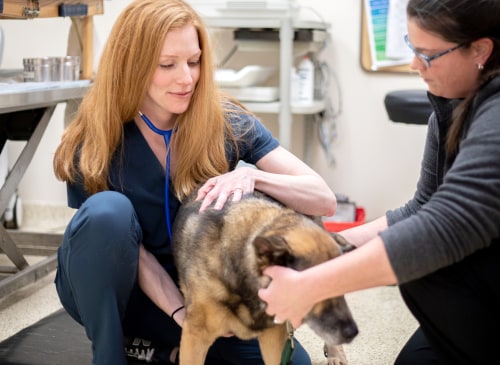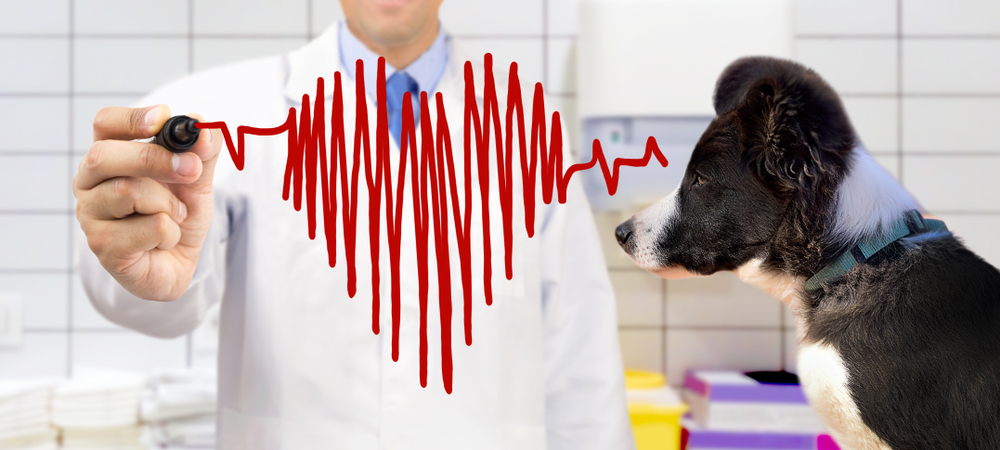How to Tell if Your Pet Needs an Ultrasound For Dogs}
Discovering the Essential Providers Offered by a Vet Cardiologist: Understanding Ultrasound and CT Scan Methods
Vet cardiologists play an important role in the health and wellness of pet dogs by detecting and treating different heart disease. They use sophisticated imaging strategies, such as heart ultrasound and CT scans, to provide precise examinations. Each approach has its unique advantages and applications. Comprehending these methods is important for pet proprietors seeking the finest look after their friends. What aspects should animal owners consider when choosing in between these analysis tools?

The Function of Vet Cardiologists in Animal Medical Care
Veterinary cardiologists play an essential function in the medical care of animals, concentrating particularly on detecting and treating heart-related conditions. They possess specialized training that permits them to translate complicated analysis tests and determine numerous cardiovascular issues. These professionals utilize advanced techniques, such as echocardiography and electrocardiography, to analyze heart feature and framework accurately.Veterinary cardiologists additionally establish customized treatment plans that may consist of drugs, way of living alterations, and, in many cases, surgical interventions. Their knowledge encompasses educating pet proprietors concerning heart health and wellness, emphasizing the importance of routine examinations and early discovery of potential troubles. Cooperation with basic vets is important, as it guarantees thorough look after family pets with believed cardiac issues. By offering specialized solutions, veterinary cardiologists significantly improve the quality of life for pet dogs and give comfort for their owners, strengthening the value of heart wellness in general family pet health.
Usual Cardiac Issues in Pets
Common heart concerns in family pets can significantly affect their health and high quality of life. Heart whisperings, various kinds of cardiomyopathy, and congenital heart flaws are among one of the most widespread conditions that vets come across. Ultrasound For Dogs. Comprehending these issues is necessary for animal proprietors to guarantee timely medical diagnosis and ideal treatment
Heart Murmurs in Pets
Although heart whisperings can be a source of problem for animal proprietors, they are not constantly indicative of significant wellness issues. A heart murmur is an uncommon noise generated by turbulent blood flow within the heart. In family pets, these whisperings can be brought on by numerous factors, including hereditary heart issues, shutoff concerns, and even tension throughout examinations. Numerous family pets with heart whisperings lead typical lives without substantial health effects. To figure out the underlying cause, veterinary cardiologists commonly use analysis strategies such as echocardiograms and Doppler ultrasounds. Early discovery and evaluation are necessary, as they might aid take care of any kind of possible cardiac issues successfully. Family pet proprietors are urged to consult their vet for a detailed analysis if a heart murmur is detected.
Cardiomyopathy Types Explained
Cardiomyopathy encompasses a group of diseases affecting the heart muscle, leading to compromised heart feature in family pets. One of the most typical types consist of expanded cardiomyopathy (DCM), hypertrophic cardiomyopathy (HCM), and limiting cardiomyopathy (RCM) DCM mainly impacts canines, causing the heart to enlarge and weaken, which lessens its capability to pump blood efficiently. On the other hand, HCM is much more prevalent in pet cats, identified by the thickening of the heart walls, usually resulting in blocked blood circulation. RCM, though much less typical, occurs when the heart muscular tissue comes to be stiff, restricting its ability to full of blood. Each kind provides unique obstacles in medical diagnosis and treatment, necessitating specialized vet cardiological evaluation to assure peak monitoring and care for influenced family pets.
Congenital Heart Problems
Hereditary heart problems stand for a considerable classification of cardiac problems in pets, unique from acquired conditions such as cardiomyopathy - CT Scans For Animals. These problems are architectural abnormalities existing at birth, affecting the heart's typical function. Usual types consist of license ductus arteriosus, ventricular septal problems, and pulmonic constriction. Signs might vary commonly, varying from mild to extreme, and can include exercise intolerance, coughing, and difficulty breathing. Early diagnosis via sophisticated imaging strategies like ultrasound is important for efficient management. Veterinary cardiologists play a vital role in determining these problems and recommending suitable treatment choices, which might consist of medical monitoring or medical intervention. Acknowledging hereditary heart issues permits much better end results and boosted high quality of life for impacted pet dogs
Understanding Cardiac Ultrasound: How It Works
A substantial variety of veterinary practices now use cardiac ultrasound as a necessary analysis tool for evaluating heart health in animals. This non-invasive strategy makes use of high-frequency acoustic waves to develop pictures of the heart's structure and feature. Throughout the treatment, a vet professional uses a gel to the pet's upper body and makes use of a transducer to send out ultrasound waves. These waves jump off the heart and bordering frameworks, producing real-time pictures on a monitor.Veterinarians can evaluate different aspects discover this of cardiac health, including chamber dimension, wall surface movement, and valve function. In addition, heart ultrasound enables the detection of abnormalities such as liquid build-up and congenital heart defects. This strategy is vital for detecting conditions that may not be visible with typical radiographs. By giving detailed details regarding the heart's makeup and performance, heart ultrasound help in formulating effective treatment plans for animals suffering from heart disease.
The Relevance of CT Checks in Diagnosing Heart Issues
Exactly how do CT scans enhance the medical diagnosis of heart problems in veterinary medication? CT scans supply comprehensive cross-sectional photos of the heart and bordering frameworks, allowing vets to imagine complex physiological connections. This imaging strategy is especially valuable in determining genetic heart flaws, cardiac growths, and abnormalities in blood vessels. By using advanced imaging formulas, CT scans can assess heart chamber sizes and feature, providing a detailed view that might be challenging to accomplish with conventional methods.Additionally, CT angiography can envision blood flow and recognize areas of stenosis or obstruction, which is necessary for planning try this out prospective treatments. The speed and precision of CT scans additionally facilitate quick medical diagnoses, essential in emergency scenarios. Eventually, the consolidation of CT checks right into veterinary cardiology considerably enhances the accuracy of medical diagnoses, enabling targeted treatment plans and boosting person results for pets experiencing heart disease.
Contrasting Ultrasound and CT Check Strategies
While both ultrasound and CT scans are important devices in vet cardiology, they supply distinct advantages and restrictions that influence their use in identifying heart problems. Ultrasound, or echocardiography, gives real-time imaging of the heart's framework and feature, permitting vets to analyze heart chambers, shutoffs, and blood circulation. It is particularly effective for assessing conditions like heart disease and cardiomyopathy. Ultrasound might be limited in imagining certain anatomical structures due to person dimension or obesity.In additional reading comparison, CT scans offer detailed cross-sectional photos of the heart and bordering tissues, making them suitable for identifying architectural irregularities, tumors, or vascular issues. Although CT scans provide extensive understandings, they require sedation and may entail radiation exposure. Inevitably, the option between ultrasound and CT checks depends upon the particular professional circumstance, the client's condition, and the details needed for an accurate medical diagnosis.
Treatment Alternatives Available Through Veterinary Cardiology
Vet cardiology provides a range of therapy options customized to attend to various heart disease in animals. Treatment plans usually begin with way of living alterations, including diet adjustments and exercise adjustments, targeted at improving general heart health and wellness. Drugs play an important duty, with cardiologists recommending drugs such as diuretics, beta-blockers, and ACE preventions to handle signs and improve heart function.In much more severe instances, interventional procedures, such as balloon valvuloplasty or stent placement, might be essential to alleviate blockages or improve blood circulation. For sure congenital heart problems, surgical choices may be discovered to deal with structural concerns. Furthermore, continuous surveillance and follow-up treatment are important components of an extensive therapy plan, enabling timely adjustments based on the animal's action to therapy. Overall, veterinary cardiology concentrates on giving reliable, personalized treatment to enhance the health and wellness and well-being of pet patients with heart conditions.
Just how to Prepare Your Pet Dog for a Heart Assessment
Preparing an animal for a cardiac evaluation is crucial to guarantee precise results and a smooth process. Proprietors ought to first arrange the visit with the veterinary cardiologist and go over any particular demands or worries. It is a good idea to withhold food for at the very least 12 hours before the examination, as this helps enhance imaging quality throughout treatments like ultrasound or CT scans.Additionally, preserving a calm setting on the day of the appointment can help in reducing the family pet's anxiety. It is useful to bring along any kind of relevant medical records, consisting of previous tests and medications (CT Scans For Dogs). Owners need to also ensure that their family pet fits and leashed during transportation to the center. Familiarizing themselves with the examination process can relieve fears and assist in asking informed concerns during the appointment. By following these actions, owners can contribute considerably to the performance of the cardiac assessment
Often Asked Questions
For how long Does a Heart Ultrasound or CT Check Take?
The duration of a cardiac ultrasound commonly ranges from 30 to 60 minutes, while a CT check may take approximately 15 to thirty minutes. Elements such as the client's condition can affect these time price quotes.

Are There Any Type Of Threats Related To These Analysis Treatments?

Can I Keep With My Pet Dog Throughout the Treatment?
The vet center's policy normally determines whether family pet owners can continue to be throughout treatments. While some clinics urge owner visibility for convenience, others might need splitting up to ensure security and suitable problems for diagnostic imaging.
Just how Much Do These Analysis Examinations Usually Cost?
The prices of analysis examinations, such as ultrasound and CT scans, usually vary based on place and facility. Generally, rates range from a few hundred to over a thousand bucks, mirroring the intricacy and technology included.
What Is the Healing Refine After a Heart Evaluation?
The recuperation procedure after a heart examination includes checking the pet dog for any prompt reactions, guaranteeing comfort, and limiting exercise. Veterinarians typically give post-evaluation guidelines to direct animal proprietors throughout this necessary recovery period. Heart whisperings, different types of cardiomyopathy, and hereditary heart problems are amongst the most widespread problems that veterinarians run into. A heart whispering is an unusual noise created by turbulent blood flow within the heart. Cardiomyopathy encompasses a group of conditions impacting the heart muscle mass, leading to endangered heart function in pets. Congenital heart problems stand for a substantial classification of heart concerns in pet dogs, unique from gotten problems such as cardiomyopathy. Ultrasound, or echocardiography, gives real-time imaging of the heart's framework and function, allowing veterinarians to analyze heart chambers, valves, and blood flow.